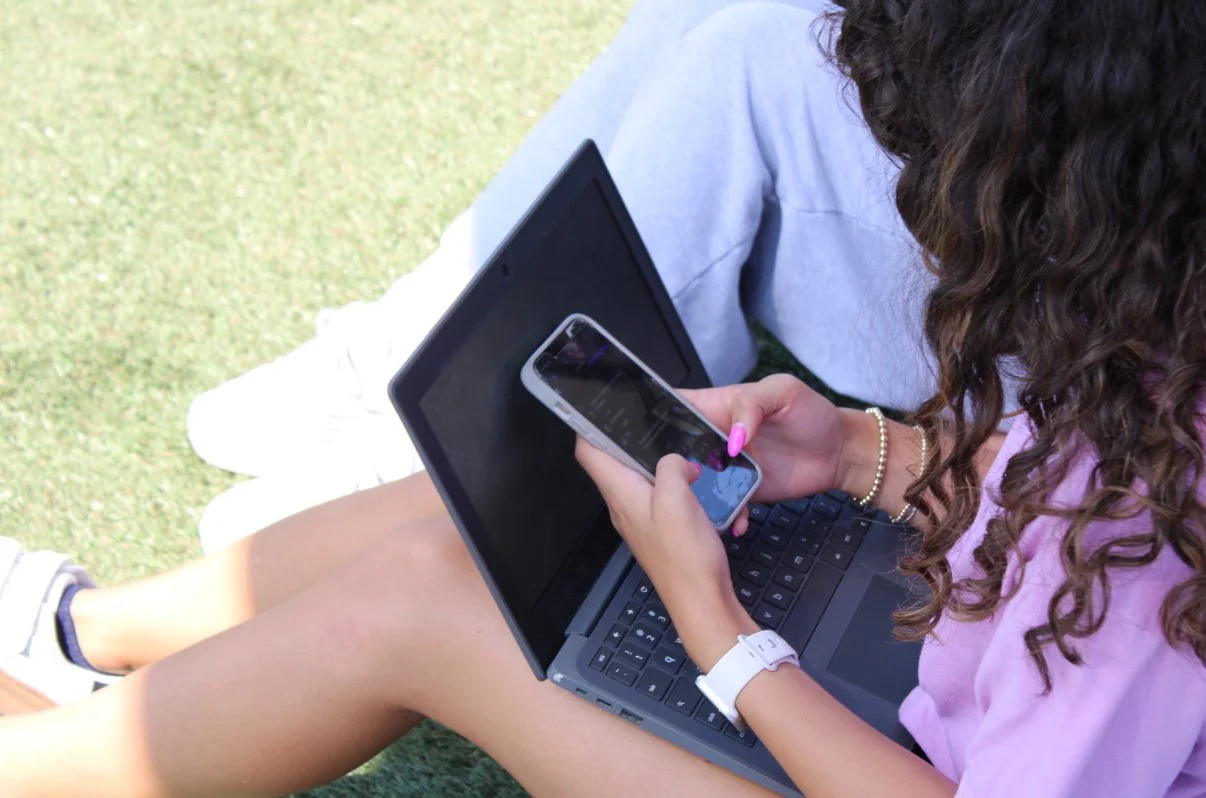Oklahoma State-Wide Phone Ban Strikes up Conversation for Jenks High School Students
Picture credits: Dillan Cox
By: Dillan Cox
Last school year, phones were a common sight in our school days. Students' eyes glued to their phones at lunch, surrounded by their peers, who did the same, AirPods in both ears, blasting music. Hallways were filled with teenagers texting or calling as they walked from class to class. But since the ¨bell-to-bell¨ state wide phone ban was implemented, things have changed---not a phone in sight. Whether you're for the ban or against it, it seems like everyone has an opinion. Concerns for safety and being able to focus without music battle reports of more involved and more social classes. An anonymous survey was conducted as an opportunity for students to express how they really feel, in their own words. From Freshmen to Seniors, our Jenks student body has had a lot to say about it.
Source #1
“Phones are a privilege and responsibility; they can be taken advantage of, yes,” said Jenks Senior #1. “However, they are a way for many to feel safe by being able to contact a guardian as well as being able to keep up with their responsibilities.”
With 80 survey submissions, 75% of students agreed that one of their main concerns about the phone ban was how they can contact their parents or employer quickly, if needed. Asking about a ride home, arranging an early dismissal, bleeding through a pair of shorts with no extra pair; these are just some of the concerns that have come up. Another 61% argued that no longer being allowed to listen to music was a second negative factor because it is an aid to their focus that they have grown accustomed to.
Source #1:
“Music has become so important to kids these days because it helps anxiety, studying and reading and more and gives you motivation!” said anonymous Sophomore.
Source #2:
“I am unable to focus on independent work or reading without using my airpods,” said Senior #2. “ I think if I could ask the teacher if I can turn on my music and then put my phone away this could help the issue.”
While students listed a lot of issues that they had with the phone ban, it appears that some students were positively affected by the ban as well. Without the use of phones in classes, lunch, or advisory, people had no choice but to talk to each other eventually. A portion of testimonies mentioned the shift in socialization they have not only noticed, but grown to enjoy.
Source #1:
“I think we should keep the ban. People are more social in a real way,” said Jenks Sophomore #2
Not only were students commenting on an increase of socialization at times where it was once lacking, they also mentioned a better ability to focus during class time. In fact, 21.3% of the surveyed students expressed better engagement in their day to day classes.
Source #1:
“It really does help me be more efficient with my class time,” said an unnamed Junior.
Source #2:
“Not having my phone has helped me stay more focused and on task,” said another Junior.
Nearly every survey submission received had something more to say about the ban. A large portion of them gave their own ideas on how to make the ban work for everyone. Each response mentioning a solution voiced a strong opinion, meeting the other side of their argument with understanding, instead of hate.
Source #1:
“During class time and passing, I’m with you,” said Senior #3, “but lunch feels unnecessary since it’s not an active learning period.”
Source #2:
“I think that a phone ban while we’re in class makes sense and I do think it helps my productivity to some extent but I don’t agree with a complete phone ban the entire school day. I don’t think it’s necessary during lunch or passing period as lunch is typically people's social hour and time to wind down from their classes,” said Senior #4.
Source #3:
“Banning the use of cell-phones during class and instructional time is not unreasonable and to be expected. However, taking them away during lunch, advisory, and passing period is just unnecessary and a potential safety hazard. It’s also just inconvenient and makes simple communication difficult. I’m not going to the office to contact my parents when a quick text could be sent in under a minute,” said Senior #5.
This new law has challenged our students in new ways. Something we have been using as part of our daily routine for years has been cut off. As schools continue adjusting, students are learning to navigate classrooms without their devices, creating new obstacles, as well as new opportunities for academic growth.
